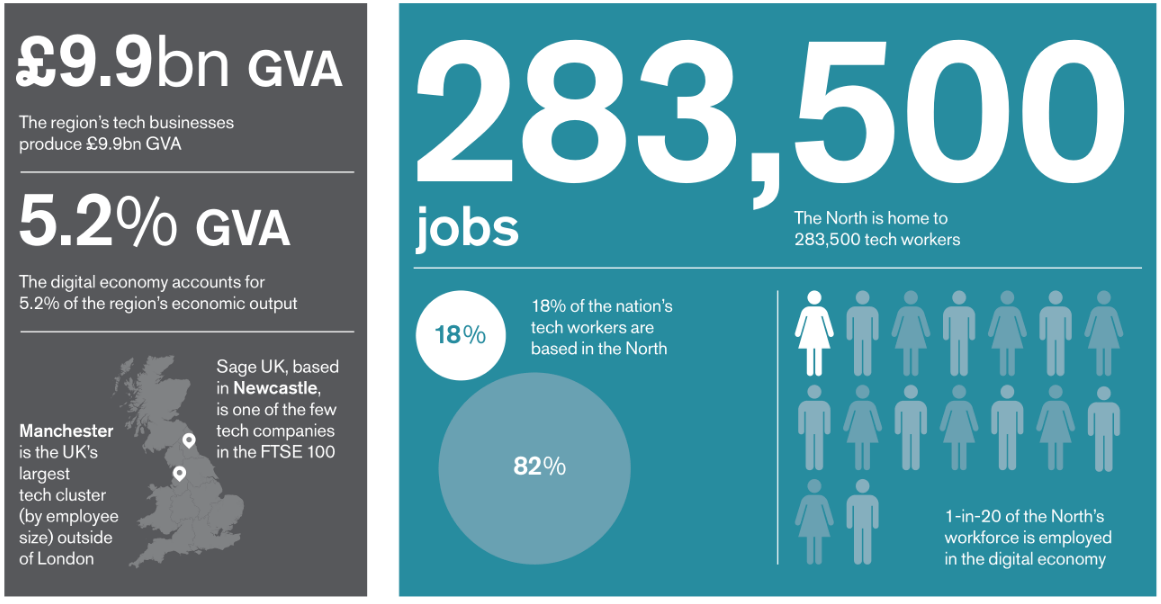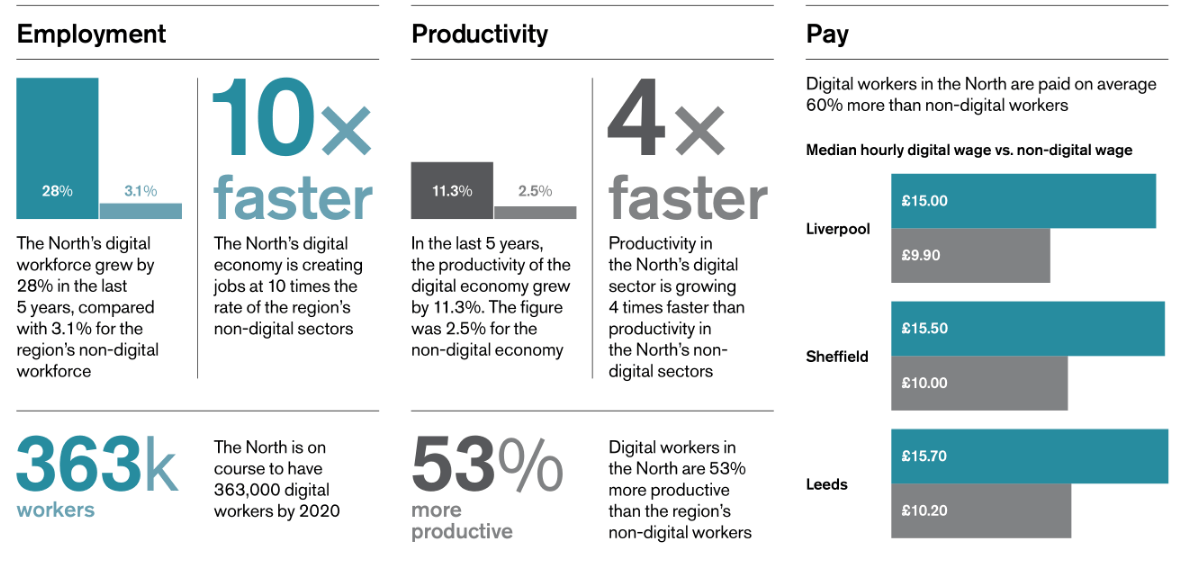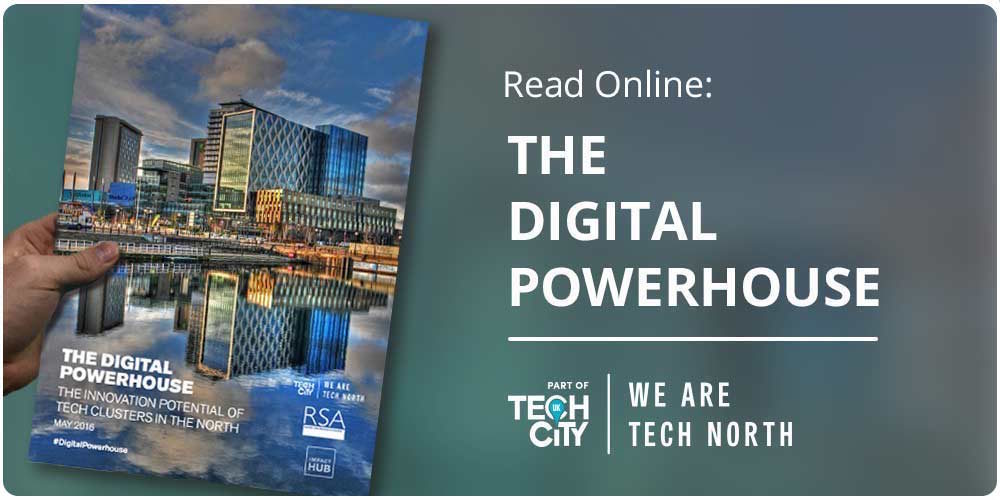Today marks the launch of ‘The Digital Powerhouse’ report from Tech North, showcasing how collaboration can turbo-charge the Northern tech economy and grow it to the tune of £5.7bn by better connecting its tech clusters
The tech industry in the North of England is booming – but better collaboration with local industries and public services is a must if the region’s tech clusters are to thrive, according to new research commissioned by Tech North and published today by the RSA and Impact Hub.
The report, The Digital Powerhouse (published today in collaboration with the RSA and Impact Hub), found that the digital sector is fuelling growth in the North’s economy. Manchester now has a world-class digital marketing cluster, HealthTech has become a strong suit for Leeds, and Liverpool is building a reputation for expertise in the Internet of Things.

Digital jobs in the region are increasing at ten times the rate of jobs in non-digital sectors – with the total tech workers now reaching 283,500 – and the productivity of digital workers is 53% higher than that of non-digital workers. This in turn has fed into higher earnings, with digital workers in the North enjoying a 60% wage premium over their counterparts in the rest of the economy.
Yet the North’s Digital Powerhouse is still some way from fulfilling its potential, argues the report. Raising productivity to the national average for tech workers would result in a £5.7 billion increase in GVA for the northern economy. And increasing the rate of digital self-employment in line with the national average would result in over 9,700 more tech founders.

In a bid to strengthen the North’s digital economy, the government and tech advocates have focused their efforts on improving talent, infrastructure, finance and culture. However, The Digital Powerhouse argues that closer attention should be paid to a fifth condition: the availability of market opportunities. The report authors say that for too long support efforts have focused on getting tech startups up and running without considering how they can subsequently win paying clients.
Local industries in the region – including retail, logistics and manufacturing – constitute lucrative untapped markets for tech firms, as do the health, education and local government sectors. The Digital Powerhouse suggests that the North’s tech companies can play a vital role in helping the region cope with an oncoming wave of ‘digitisation’, where more industries are likely to face the same fate as the media and publishing sectors.
The report highlights several existing examples of local collaboration. In manufacturing, Manchester-based tech company 2M Automation worked with the Nissan car plant in Sunderland to improve operations on its machine conveying system. While in the field of health, Yorkshire-based company Immedicare created a telecare service that links care homes in Airedale with clinicians in the nearby hospital.
Responding to the report’s findings, James Bedford at Tech North, said: “Tech North was established to support the northern tech clusters and we commissioned this report to highlight the many assets and opportunities for collaboration and growth on our doorstep. Accessing data resources, corporate supply chains and public procurement options can be hard but the rewards can be significant. We, in the North, can capitalise on this by finding new ways to engage with market opportunities. We hope this report not only reveals opportunities but also inspires tech companies to forge new paths to unlock new marketplaces. The rewards of fuelling the growth of tech companies in the North are huge.”
Commenting on The Digital Powerhouse, one of the report’s authors, RSA Associate Director Benedict Dellot, said:
“For many people, the tech industry conjures up images of billion dollar IPOs, celebrity founders and cult brand followings. Our report argues that the North’s tech clusters can pioneer a different way of doing tech. Rather than be isolated and inward-looking, tech businesses should be woven into the fabric of their local communities, supporting them as they seek to navigate their way through a new digital era that will bring tremendous challenges. Whether it is an EdTech company working with local schools to bring e-learning into the classroom, or a data analytics company helping manufacturers improve machine efficiency on the factory floor, the scope for win-win collaborations in the North is vast.”

The Digital Powerhouse finishes with several recommendations to create a more vibrant and collaborative tech ecosystem. This includes introducing ‘tech taster’ vouchers that local SMEs can exchange for tech support, giving them a taste of what tech could do for their business. Another recommendation is to promote the tech-cooperative model, which would see tech workers supporting one another in times of need and coming together to pitch for higher value public contracts.
Other recommendations include:
- Establishing a Digital Powerhouse Contract Portal – A portal could be created that collates private and public sector contracts in one place, establishing a Northern hub of commercial opportunities for tech companies.
- Making the North a test bed for experimental tech – Northern tech clusters should encourage private and public sector organisations to trial pioneering innovations in the region, such as the use of robotics in social care or blockchain technology in welfare payments.
- Encouraging the use of open source software – Partners in the North should champion the use of open source software to enable collaborative innovation, opening software markets up to more local competition.
- Establishing digital immersion events – Public service teams should consider organising events with nearby tech communities in order to share procurement knowledge and better understand local needs and strengths.
- Creating a ‘Procurement Powerhouse’ social enterprise – Northern entrepreneurs should consider creating a social enterprise to link public sector buyers with tech businesses in the region.
- Organising a ‘600 that Share’ movement – The region’s 600 very large businesses should be encouraged to pledge to do more to support their local tech community.
- Pooling the resources of university outreach teams – The outreach teams of Northern universities should consider joining forces to present a single unified offer to local tech businesses.
Check out The Digital Powerhouse here.


